Embodying the music
by Kate Frentzel
They’re engineers, teachers, IT workers, and speech pathologists. They’re graduates from four years ago and thirty-five years ago. Their circumstances and daily lives look different, but each Tuesday night, they gather at Mount Olive Lutheran Church in Minneapolis to lend their voices and their spirits to creating transcendent music together as part of the National Lutheran Choir (NLC).
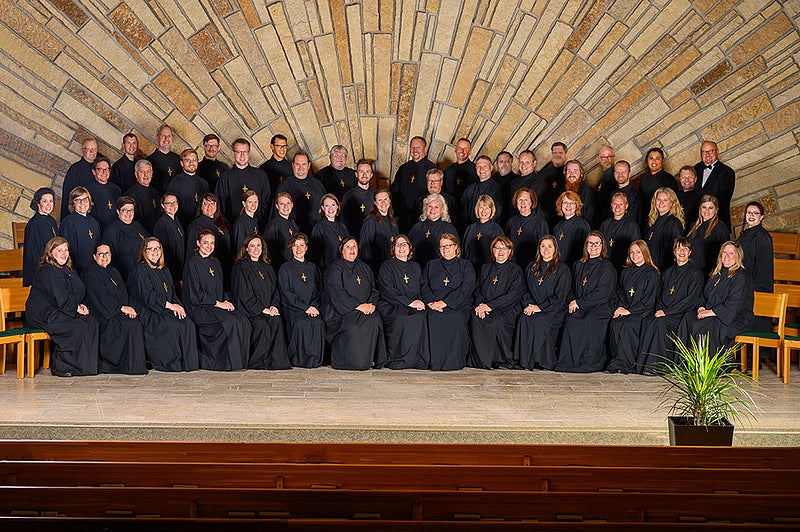
This season, the 62 singers in NLC come from a total of 23 colleges and universities. The top three include Luther with 13, St. Olaf with 11, and Concordia with 10. Photo by Leslie Ortiz.
Founded in 1986, NLC has a national reputation for strengthening, renewing, and preserving the heritage of sacred choral music. NLC singers of all faiths perform this music—from early chants to complex masterworks—with a high level of technical skill, artistry, and meaning. And they share this gift of sacred music with audiences nationwide.
Luther grads in NLC really valued their time in choirs like Nordic, Cathedral, Collegiate, and Aurora. They’ve been happy to find that, while NLC is its own unique experience, it also mirrors the connection—to people, music, and worship, however it’s defined—they felt during their choral experiences at Luther.
Luther is the best-represented college in the choir: a whopping 13 of its 62 members are Norse. Why do so many Luther singers find their way to this new community? What do they bring to it? What does it give to them? And, singing together, what do they offer the wider world?
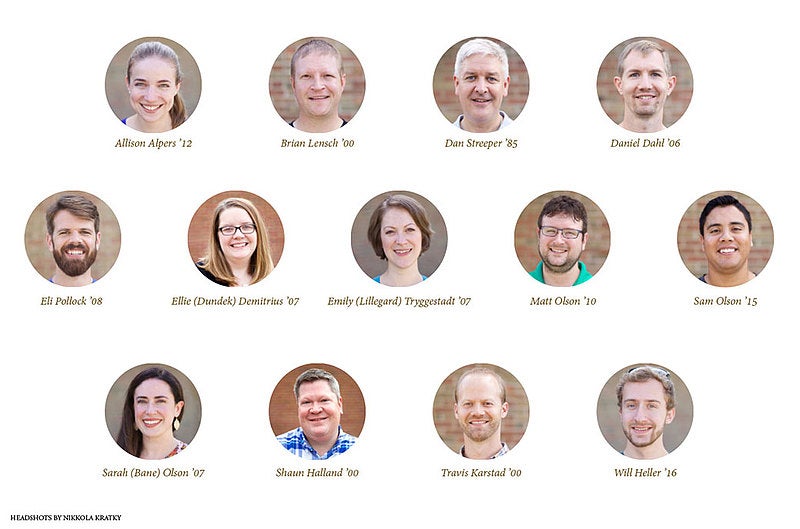
Luther is the best-represented college in the choir: a whopping 13 of its 62 members are Norse.
A new choral home among familiar faces
At the beginning of each season, NLC members meet for a daylong retreat during which new members are introduced. Choir director David Cherwien, himself an Augsburg grad, says, “One of the first things that usually gets announced is where they went to college. When the Luther people come up, there’s a massive uproar. It’s always fun to watch the face of the person coming in, because they don’t really know yet how many people from their college are in the group. So when you see and hear that, it’s pretty overwhelming.”
He continues, “It’s fun too that they kind of divide themselves into groups. I was a Weston Noble singer. I was a Craig Arnold singer. I was an Allen Hightower singer. We have all of those in our ranks.”
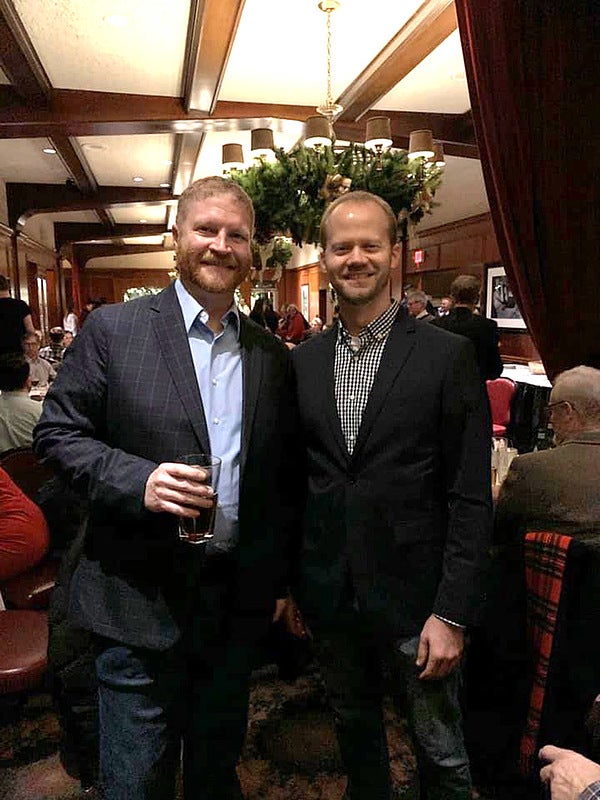
Brian Lensch ’00 and Travis Karstad ’00 have been the best of friends since their first year at Luther. Photo courtesy of Brian Lensch ’00.
While Luther alumni may be surprised at how many Norse are in the choir, most audition for NLC knowing that Luther grads gravitate there. Maybe they already had friends in the choir. Maybe a Luther professor pointed them toward the group. Regardless of how they heard about it, most auditioned for NLC because they were looking for community, high-caliber singing, and spiritual engagement with choral music. In those areas, NLC can’t be beat.
Will Heller ’16 was well aware of the choir’s reputation even as a Luther student singing with Cathedral Choir his sophomore year. “We actually performed at the church where NLC rehearses. That was how I learned about them, because my more musically savvy friends were all abuzz when we were at this church. There were rumors left and right. Oh, I hear this is where NLC rehearses! I hear that their director will be at the concert! It went so far as I hear they have their own private jet!”
They don’t, for the record, have a private jet, but the rumors speak to the perception—and the reality—that NLC is an elite group of volunteer singers who make sacred music at a very high level. That’s part of what attracted Travis Karstad ’00 to the group. He was living in the Twin Cities with two Luther alumni—including fellow NLC member Brian Lensch ’00—when the three of them decided to audition. “I was familiar with NLC and the high quality of sound that they produced,” he says. “I was in awe of it then, and I still feel that way now.” He’s been singing with NLC since 2001.
Eli Pollock ’08 had been searching for something like his college choral experience. He says, “I realize now that the college experience can never really be re-created, but NLC and the Lutheran choral tradition that it holds feel like home to me.”
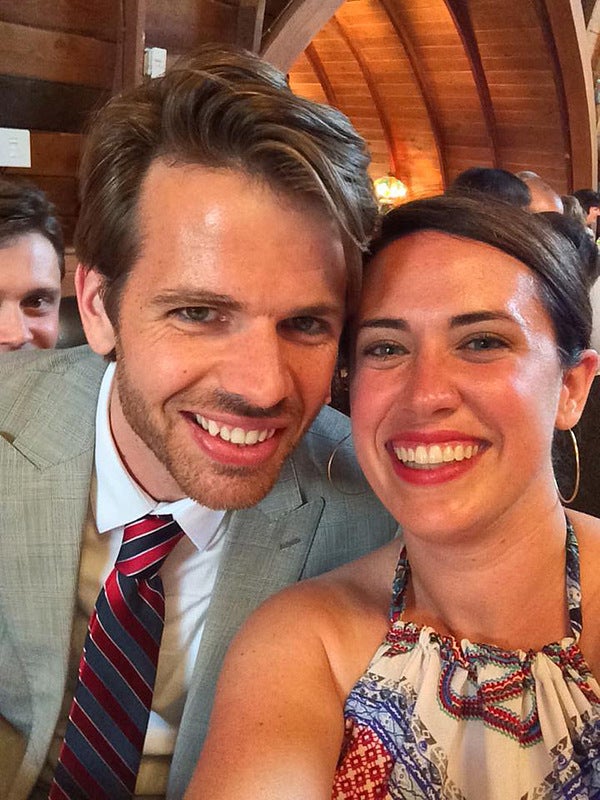
Eli Pollock ’08 and Sarah (Bane) Olson ’07 both sang under Weston Noble ’43 at Luther. Now they sing together in NLC. Photo courtesy of Sarah (Bane) Olson ’07.
Sarah (Bane) Olson ’07 sought out NLC for similar reasons. After graduating from Luther, she says, “I had a choir-sized hole in my heart. . . . It’s coincidental that the choir I ended up finding my new choral home with was a part of the Lutheran choral tradition, but I’d like to think that the Holy Spirit had something to do with that fortuity.”
For many singers, however, the Lutheran choral tradition is the draw.
Singing spiritual music
“My main interest in joining was the religious aspect of the choir,” says soprano Emily (Lillegard) Tryggestad ’07. “There’s something sacred in choral singing that can’t be achieved through secular music.”
“It’s a lot of the music I love and have a deep spiritual connection to,” says Allison Alpers ’12. “One of the things that NLC does really well is explore spirituality through music and what that means for different people, because we’re not, by any means, all Lutherans in the choir.”
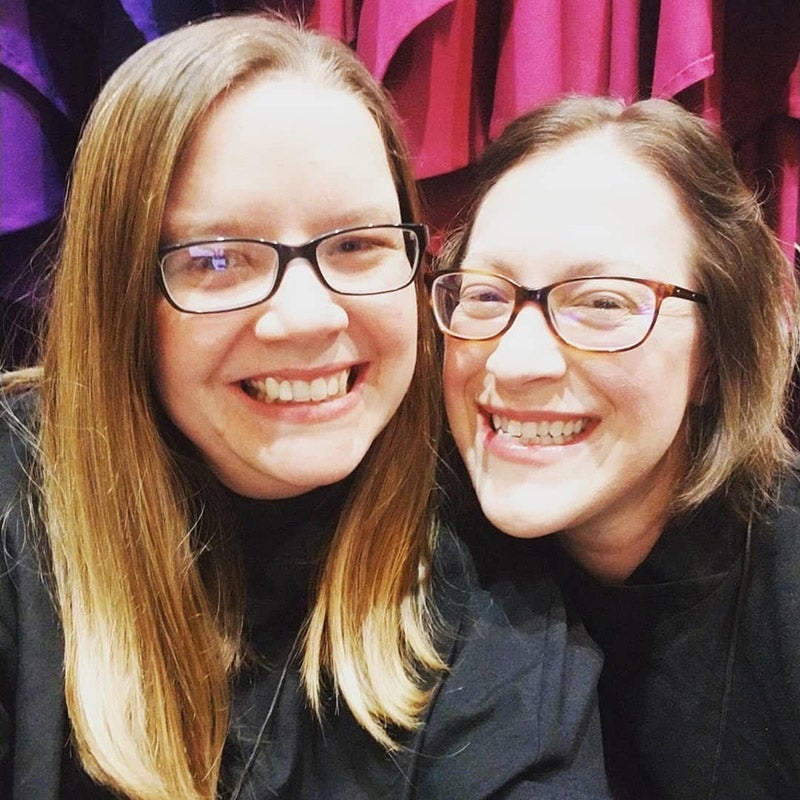
NLC choir members Ellie (Dundek) Demitrius ’07 and Emily Tryggestad ’07 sang together—along with 11 other Luther grads—during NLC’s winter tour. Photo courtesy of Emily Tryggestad ’07.
Like many Lutheran choirs, NLC begins each practice with one of the singers offering a devotion—a brief reflection on the text the group will be singing. “It gives a glimpse into what’s going on in their minds and how they’re connecting with the meaning of the program,” Cherwien says. “As the person who puts these programs together, one thing I’m careful not to do is dictate what they’re going to mean. People perceive different things in the common song that we’re singing. That’s actually the way art needs to work, because people perceive art through the lens of their life experience, and devotions give us a little glimpse of that. It’s always fascinating. People are at radically different places with their faith or what they believe or what they’re thinking about, and this is a place where diversity can shine.”
“There have been times when a song, the lyrics, or even a devotion from a fellow singer pull on my heart strings, and it’s those times when you truly know why you’re there,” Lensch says.
Tenor Shaun Halland ’00 says, “I connect so strongly with the texts we sing, and one can’t help but emotionally engage with the music. Life experiences continue to shape the music we make and provide renewed meaning to music that was written ages ago.”
“We get to mean what we sing.”
From the annual All Saints concert to locking eyes with an elderly audience member while singing “It Is Well with My Soul” during a tour in Arizona, most Luther choir members can name NLC singing experiences that have moved them spiritually.
Heller points to a Midwest tour during which the group performed the “Holy Spirit Mass” by Kim André Arnesen at the Basilica of the Sacred Heart in Notre Dame, Indiana. In that piece, Heller says, there is an Agnus Dei, which translates to Lamb of God, you take away the sins of the world. Heller hears this as a cry for peace. It was the group’s first stop on the tour. They’d spent eight hours on the bus.
Heller says, “I’d never been to Notre Dame, I was geographically confused, and I’d left a score on the bus—my very first performance on an NLC tour. The fifth movement sort of erupts in a very particular moment. It was one of those moments I really couldn’t help feeling deeply. It was this call for peace in the middle of a really hectic day. I remember after the concert walking back to our changing rooms when I ran into Brian Lensch. He said, ‘Hey, I thought we did a good job.’ I was clearly out of it. He said, ‘Oh, you’re feeling it, aren’t you?’ And he brought me in for a hug.”
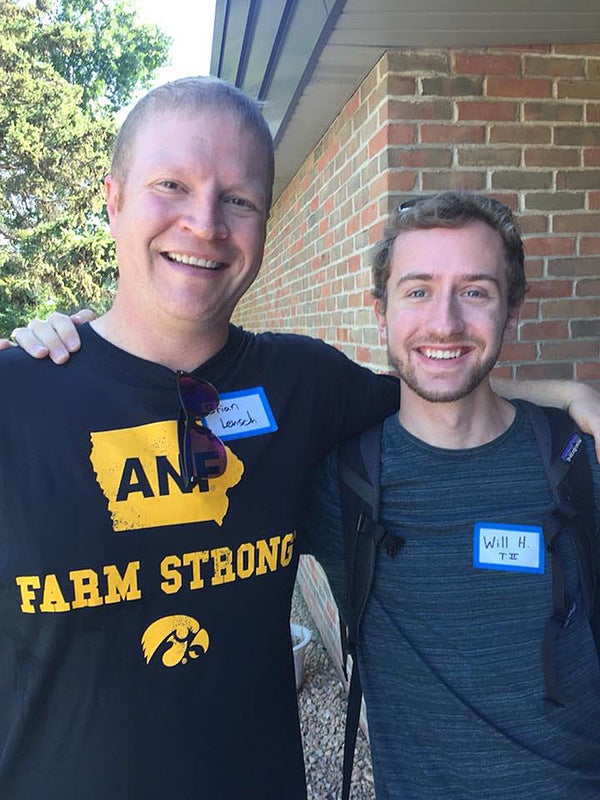
Brian Lensch ’00 (left) and Will Heller ’16 grew up about a mile from each other in Cedar Rapids, Iowa, attended the same high school and college, and now sing in NLC together. Photo courtesy of Brian Lensch ’00.
Cherwien says, “I think what distinguishes us as an adult performing choir is that we are unabashedly meaningful. In other words, we mean what we sing. Actually, our phrase is we get to mean what we sing. The choral music world is such that you could find enough to love in the music alone. But we get to go to that next layer of owning the meaning that so much of it is. The group finds deep meaning in our programs, and they look for it, and then we get to own it. We get to embody it.”
This is, Heller says, what motivates him as a singer, and the personal, emotional experiences just happen to derive from it: “At the end of the day, I’m embodying the music so the audience can have that experience.”
There for each other
“There’s nothing like making music with other people,” Cherwien says. “Especially vocal music. I know instrumentalists don’t like to hear that, but there is a difference: in singing, the vibration is internal.”
A growing body of research suggests that group singing produces physical effects from increased endorphins to reduced stress hormones to syncopated heartbeats and breathing. Luther NLC members report these and other benefits.
Alpers says, “Even if it’s an intense rehearsal where we’re really focused on learning music and maybe not making music quite yet, it’s still so mentally engaging—you have to be in the moment where all of that mindfulness and grounding and other benefits from singing happen.”
There’s also the benefit of emotional support during some of life’s biggest moments. One ministry of the choir is to sing at the funerals of NLC singers and their family members. “A contingent of the choir sang at my mother’s funeral in 2012, which was so incredibly meaningful,” Halland says.
NLC members (and other Luther choir friends) also sang at Olson’s wedding. “Instead of the pastor closing with a spoken benediction, my choir friends surrounded me and my husband on the altar and blessed us with their gift of song,” she says. “They sang ‘The Lord Bless You and Keep You’ by Peter C. Lutkin. About a measure in, I was ugly crying. It was the perfect ending to one of the most special moments of my life.”
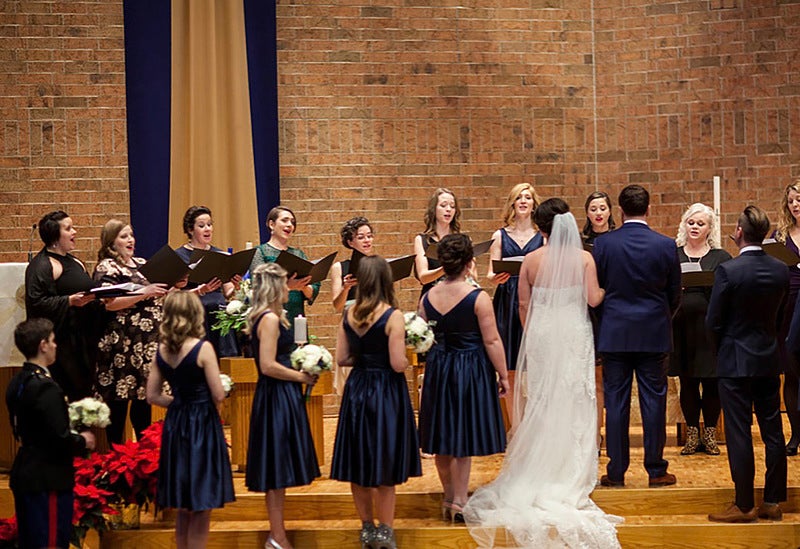
NLC members show up for each other. When Sarah (Bane) Olson '07 got married, she asked NLC friends and Luther choir friends to sing at her wedding. "Instead of the pastor closing with a spoken benediction, my choir friends surrounded me and my husband on the altar and blessed us with their gift of song," she says. "They sang, 'The Lord Bless You and Keep You' by Peter C. Lutkin. About a measure in, I was ugly crying. It was the perfect ending to one of the most special moments of my life."
In a couple of cases, Luther grads met their spouses through the National Lutheran Choir, like Emily Tryggestad and former NLC member Soren Tryggestad ’05. Emily says that they connected through the choir even though they overlapped without knowing it at Luther. “He remembers seeing me around Jenson, but I don’t really remember seeing him. That’s not a sore point for him at all,” she jokes.
Making music in a time of pandemic
Ensemble singers and musicians are feeling the pinch of physical distancing in a unique way—their art depends on being together. With singing in person no longer on the table, NLC members are turning to digital connection, even if it isn’t quite the same.
They arrange regular virtual happy hours and connect through social media, but as a “very, very relational” group, according to Cherwien, it’s been a struggle.
“We really miss singing with each other. Our Tuesday nights anchor us, and I’ve felt a little lost without my weekly musical and social connections,” Olson says.
“I can’t wait to sing again with my fellow brothers and sisters in the NLC,” Lensch says.
Members are drawing heavily on their library of YouTube recordings during this time. “It doesn’t replace breathing and vibrating together,” Cherwien says. “But it does help with the music-making part—it’s all we can do right now.”
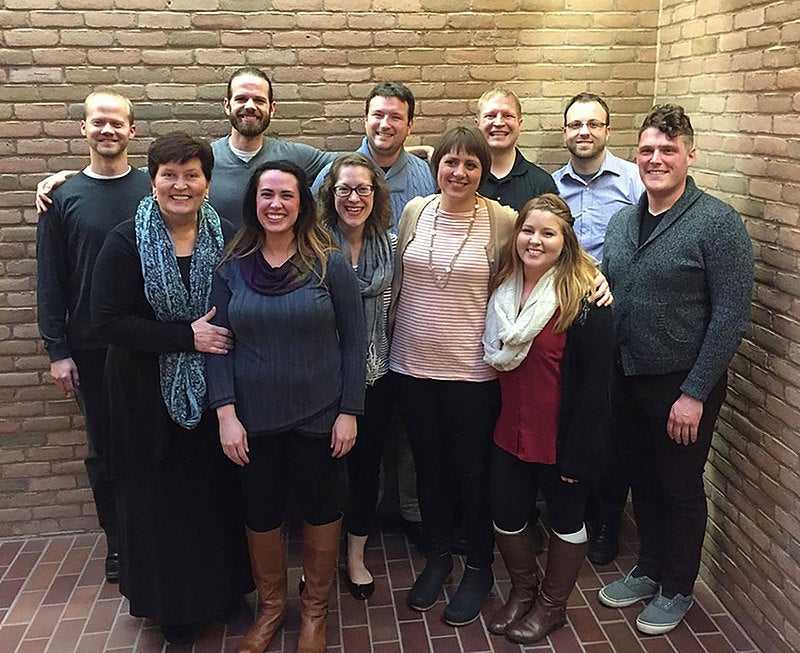
NLC members in 2016 took a moment after a concert in the Twin Cities to commemorate the event. Front row (left to right): Sandra Peter, Sarah (Bane) Olson ’07, Emily Tryggestad ’07, Brittany (Kallman) Arneson ’06, Ariel Gauslow ’13, Zach Busch ’09. Back row: Travis Karstad ’00, Eli Pollock ’08, Matt Olson ’10, Brian Lensch ’00, Soren Tryggestad ’05. Photo courtesy of Emily Tryggestad ’07.
Luther singers are still finding opportunities to make music when they can. Tryggestad sings with her two-year-old, Lillian, and Olson sings with her young daughter, Silja. “It’s been filling the void of not singing with my NLC people during the pandemic,” she says. “If Silja remembers nothing else about me in her old age, I hope it’s that we sang together. Planting the seed for a lifetime of loving music is one of the best gifts I think I could ever give her.”
Pollock, who teaches pre-K–8th grade music, says, “It feels like it goes against most of my favorite parts of making music and being together with students, but I’m doing what I can. I have a middle-school choir group that used to meet before school on Fridays. We’ve held a couple of online chats where we catch up with one another, and then we all sing a song together—with everyone’s microphone off because otherwise it’s a garble of sound. So far we’ve sung ‘Somewhere Over the Rainbow’ and ‘How Can I Keep from Singing?’”
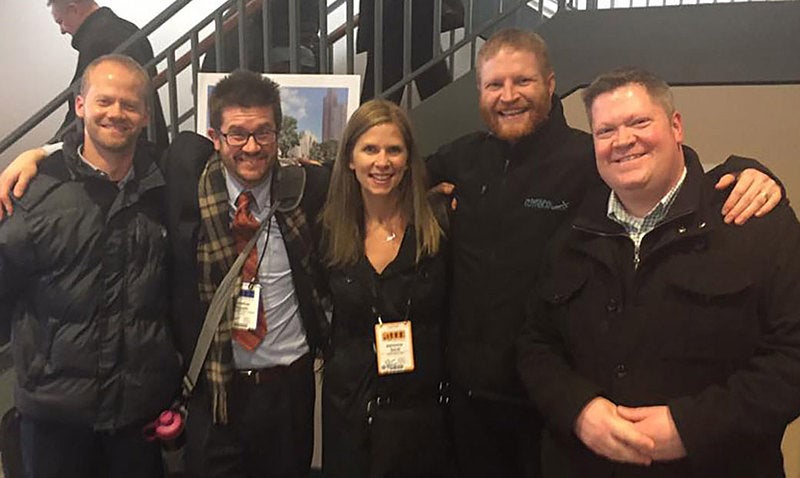
NLC sang at the 2017 American Choral Directors Association conference in Minneapolis. Afterward, NLC members met up with attendees, all class of 2000. From left: Travis Karstad, Jon Kopplin, Adrienne (Moyer) Gerst, Brian Lensch, and Shaun Halland. Photo courtesy of Brian Lensch ’00.
So how does a choir advance its art and its mission during a time when people aren’t gathering in the same physical space? By continuing to connect with each other, even if that connection is digital. “The time we get to spend together extra-musically is really something I cherish being a part of this choir,” Heller says. “Being on a bus for eight hours, being at a hotel bar after a concert, the times we’re able to connect not just as musicians but as people—some of my strongest friendships have been formed during those times. That’s how we’re able to come together as an ensemble—because we’re able to come together as humans.”